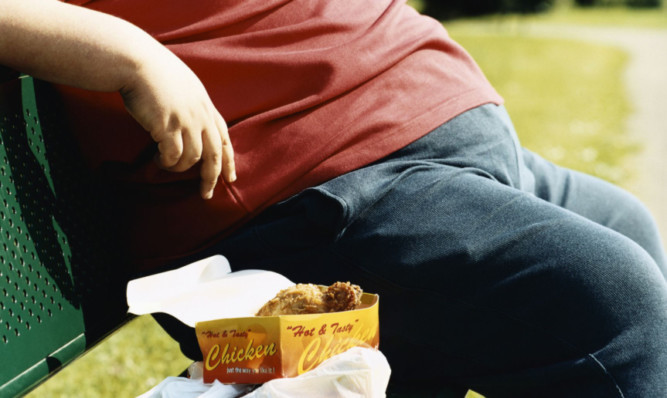
Britain’s obesity benefits scandal.
Hundreds of Britons are claiming benefits simply because they are too fat to work.
Almost £10 million a year is being dished out to people whose main disabling condition is obesity.
A breakdown of official figures showed the number claiming benefits for that reason had almost doubled since 1997 to 2,014. The figure is stark evidence of the UK’s obesity epidemic.
It also follows revelations a fat mum and daughter don’t want to work because they rake in a hefty £33,600 a year in benefits between them.
Twenty-five stone Janice Manzur, 44, and daughter Amber, 25, from Kirkcaldy, Fife, said they couldn’t help being fat and deserved the money they got.
But critics have weighed into the argument, saying obese people need medical help to turn their lives around rather than benefits.
Tam Fry, spokesman for the National Obesity Forum, said: “Too many people are saying ‘I can’t work because I’m fat’.
“A lot of people might qualify if they have a medical condition they can do nothing about and they can quite legitimately get disability allowances.
“However, far too many people get benefits simply because they are too lazy to get a job. A lot of people get fat because they are depressed. That’s not a reason to give them a disability allowance.
“It’s a reason for health professionals to help them tackle their weight.”
In 1997, the number claiming incapacity benefit because of their obesity was 1,100.
While that number has since fallen to 600, it’s largely because 1,230 people have been shifted on to the newer employment and support allowance and another 184 on to personal independence payments.
Claimants of incapacity benefit are paid up to £104 a week while those receiving employment and support allowance get up to £108. Personal independence payments range from £21 to £138 a week.
Despite the huge burden on taxpayers, Fatima Parker, who campaigns for body confidence, feels it is unfair to single out fat claimants.
“For years there has been a demonisation of fat people,” she said. “Even employers don’t want to take on fat people as they think they will be unproductive.
“Fat people are criticised for costing money on the NHS. Now they say we don’t deserve disability or social security like everyone else. People need to stop generalising and look at it on a case by case basis.”
Labour scrapped incapacity benefit for new claimants in 2008 and replaced it with employment and support allowance.
Similarly, personal independence payments were introduced in 2013 to replace disability living allowance.
Data from the DWP shows PIP claims from obese people have risen from just five people in October 2013 to 184 people in October 2014.
In addition, PIP claimants who suffer an “eating disorder”, rose from 16 to 494 over the same period.
The most up-to-date figures for incapacity benefit and employment and support allowance were collated in 2013.
Councils have warned they cannot afford to tackle the growing obesity “epidemic” in England and Wales unless the next government releases £1 billion for local investment.
The DWP said it is reforming disability benefits and re-assessing people on incapacity benefits to see what work they can do rather than “writing them off on sickness benefits as happened in the past”.
A DWP spokesman also said: “Being obese itself does not entitle someone to disability benefits, but rather it’s the associated long-term health effects.”

Enjoy the convenience of having The Sunday Post delivered as a digital ePaper straight to your smartphone, tablet or computer.
Subscribe for only £5.49 a month and enjoy all the benefits of the printed paper as a digital replica.
Subscribe